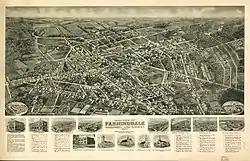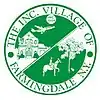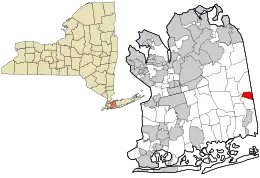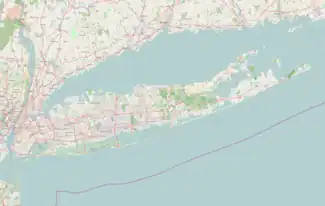Farmingdale, New York
Farmingdale is an incorporated village on Long Island within the Town of Oyster Bay in Nassau County, New York, United States. The population was 8,466 at the time of the 2020 Census.
Farmingdale, New York | |
|---|---|
| Incorporated Village of Farmingdale | |
 Panoramic map of Farmingdale from 1925, with a list of landmarks and several images in the insets at the bottom. | |
 Flag  Seal | |
| Nickname(s): "Farmingdale Village"; "The Village" | |
 Location in Nassau County and the state of New York. | |
 Farmingdale, New York Location on Long Island  Farmingdale, New York Location within the state of New York | |
| Coordinates: 40°44′0″N 73°26′42″W | |
| Country | |
| State | |
| County | Nassau |
| Town | Oyster Bay |
| Incorporated | 1904 |
| Government | |
| • Mayor | Ralph Ekstrand |
| • Deputy Mayor | William Barrett |
| Area | |
| • Total | 1.09 sq mi (2.83 km2) |
| • Land | 1.09 sq mi (2.83 km2) |
| • Water | 0.00 sq mi (0.00 km2) |
| Elevation | 69 ft (21 m) |
| Population (2020) | |
| • Total | 8,466 |
| • Density | 7,738.57/sq mi (2,987.43/km2) |
| Time zone | UTC−5 (Eastern (EST)) |
| • Summer (DST) | UTC−4 (EDT) |
| ZIP Code | 11735 |
| Area codes | 516, 363 |
| FIPS code | 36-25384 |
| GNIS feature ID | 0949918 |
| Website | www |
The Lenox Hills neighborhood is adjacent to Bethpage State Park and the rest of the town is within a fifteen-minute drive of the park. It is also approximately 37 mi (59 km) southeast of Midtown Manhattan and can be reached via the Ronkonkoma Branch of the Long Island Rail Road. The Long Island Expressway and Seaford Oyster Bay Expressway are the best way to reach Farmingdale from the city and the mainland.
History
The first European settler in the area was Thomas Powell, who arrived in 1687. On October 18, 1695, he purchased a 15-square-mile (39 km2) tract of land from three Native American tribes. This is known as the Bethpage Purchase and includes what is now Farmingdale – in addition to Bethpage, Melville, North Massapequa, Old Bethpage, Plainedge, and Plainview. One of two houses he erected in the area (built c. 1738) still stands on Merritts Road in Farmingdale.
In the 1830s, anticipating construction of the Long Island Rail Road, land developer Ambrose George purchased a large tract of land between a community then known as Bethpage, now Old Bethpage, and an area in Suffolk County known as Hardscrabble.[2][3] He built a general store in the western part of this property which he named Farmingdale. When the LIRR started service to the area in October 1841,[4][5] it used the name Farmingdale for its latest stop, here, on the line it was building to Greenport. Stagecoaches took people from the Farmingdale station to Islip, Babylon, Patchogue, Oyster Bay South, and West Neck (Huntington area).[6] [7]
In 1886 a fire department was organized, and in 1904, Farmingdale incorporated as a village.[8]
The Lenox Hills Country Club, an 18-hole private golf course designed by Devereux Emmet, was developed north of the community in 1923 and was owned and operated by Benjamin F. Yoakum. This golf course was purchased by the State of New York, was greatly expanded, and then re-opened as Bethpage State Park in 1932, with much of the golf design work carried out by golf architect A.W. Tillinghast, later inducted into the World Golf Hall of Fame. The original 1920s era Lenox Hills subdivision and later adjacent subdivisions, located between the Bethpage State Park golf courses and the Long Island Railroad trackage, encompassing rolling hills and a wide boulevard, are known as the more upscale part of Farmingdale Village. Later, Farmingdale became a locus for the aircraft industry, notably Republic Aviation Company.
In 1899, Mile-a-Minute Murphy rode a bicycle along the Long Island Rail Road's Central Branch through the Farmingdale area at a mile a minute. For many years, the town celebrated its birth with the annual Hardscrabble Fair, with music, food and games. It was normally held in May.
Usage of name
Farmingdale is also associated with several unincorporated areas outside the village limits, including South Farmingdale (also in the Town of Oyster Bay within Nassau County), and East Farmingdale (in the Town of Babylon within Suffolk County). Many nearby places not within the village limits have Farmingdale as their postal address and the same 11735 ZIP code. Residents of East Farmingdale must use Farmingdale as their mailing address, and residents of South Farmingdale can use either Farmingdale or South Farmingdale. Bethpage State Park, which is mostly in Old Bethpage, also has a Farmingdale mailing address. Farmingdale Union Free School District (UFSD 22) includes parts of both Nassau County and Suffolk County and the southernmost part of Bethpage State Park, where the clubhouse is located. A road sign on Main Street in the south-east section of South Farmingdale (and over a mile from the Village of Farmingdale) welcomes travelers to Farmingdale. Farmingdale is also the name of the local Farmingdale Water District and Farmingdale Fire District, both of which also include areas outside the boundaries of the Village of Farmingdale. Farmingdale State College and Republic Airport are in East Farmingdale, both with Farmingdale mailing addresses.
Geography
According to the United States Census Bureau, the village has a total area of 1.1 square miles (2.8 km2), all land.[9]
Between the 1990 Census and the 2000 census, the village gained territory.[10]
Climate
According to the Köppen Climate Classification system, Farmingdale has a humid subtropical climate, abbreviated "Cfa" on climate maps. The hottest temperature recorded in Farmingdale was 102 °F (38.9 °C) on July 6, 2010 and July 22, 2011, while the coldest temperature recorded was −1 °F (−18.3 °C) on January 4, 2014.[11]
| Climate data for Farmingdale, New York (Republic Airport), 1991–2020 normals, extremes 1999–present | |||||||||||||
|---|---|---|---|---|---|---|---|---|---|---|---|---|---|
| Month | Jan | Feb | Mar | Apr | May | Jun | Jul | Aug | Sep | Oct | Nov | Dec | Year |
| Record high °F (°C) | 71 (22) |
70 (21) |
82 (28) |
91 (33) |
93 (34) |
96 (36) |
102 (39) |
100 (38) |
94 (34) |
90 (32) |
79 (26) |
69 (21) |
102 (39) |
| Mean maximum °F (°C) | 58.5 (14.7) |
58.0 (14.4) |
67.1 (19.5) |
76.9 (24.9) |
84.9 (29.4) |
89.8 (32.1) |
94.5 (34.7) |
91.3 (32.9) |
87.0 (30.6) |
79.6 (26.4) |
68.5 (20.3) |
61.2 (16.2) |
95.5 (35.3) |
| Average high °F (°C) | 38.9 (3.8) |
41.3 (5.2) |
48.1 (8.9) |
58.4 (14.7) |
68.1 (20.1) |
77.2 (25.1) |
82.8 (28.2) |
81.5 (27.5) |
74.8 (23.8) |
63.9 (17.7) |
53.4 (11.9) |
44.2 (6.8) |
61.1 (16.1) |
| Daily mean °F (°C) | 32.0 (0.0) |
33.9 (1.1) |
40.4 (4.7) |
50.2 (10.1) |
59.7 (15.4) |
69.1 (20.6) |
75.3 (24.1) |
74.1 (23.4) |
67.2 (19.6) |
56.1 (13.4) |
45.9 (7.7) |
37.5 (3.1) |
53.4 (11.9) |
| Average low °F (°C) | 25.1 (−3.8) |
26.4 (−3.1) |
32.7 (0.4) |
41.9 (5.5) |
51.4 (10.8) |
61.1 (16.2) |
67.8 (19.9) |
66.7 (19.3) |
59.6 (15.3) |
48.3 (9.1) |
38.4 (3.6) |
30.8 (−0.7) |
45.8 (7.7) |
| Mean minimum °F (°C) | 8.1 (−13.3) |
11.3 (−11.5) |
19.5 (−6.9) |
30.8 (−0.7) |
41.2 (5.1) |
50.7 (10.4) |
60.6 (15.9) |
58.3 (14.6) |
48.3 (9.1) |
34.9 (1.6) |
25.0 (−3.9) |
18.7 (−7.4) |
6.8 (−14.0) |
| Record low °F (°C) | −1 (−18) |
2 (−17) |
9 (−13) |
24 (−4) |
34 (1) |
46 (8) |
53 (12) |
53 (12) |
41 (5) |
31 (−1) |
14 (−10) |
8 (−13) |
−1 (−18) |
| Average precipitation inches (mm) | 2.69 (68) |
2.03 (52) |
3.46 (88) |
3.61 (92) |
3.18 (81) |
3.45 (88) |
3.05 (77) |
3.25 (83) |
3.66 (93) |
3.37 (86) |
2.93 (74) |
3.60 (91) |
38.28 (973) |
| Average precipitation days (≥ 0.01 in) | 9.3 | 8.7 | 9.9 | 11.2 | 12.6 | 10.9 | 9.9 | 9.6 | 8.1 | 9.9 | 9.2 | 10.7 | 120.0 |
| Source 1: NOAA (mean maxima/minima 2006–2020)[12] | |||||||||||||
| Source 2: National Weather Service[11] | |||||||||||||
Demographics
| Census | Pop. | Note | %± |
|---|---|---|---|
| 1880 | 524 | — | |
| 1910 | 1,567 | — | |
| 1920 | 2,091 | 33.4% | |
| 1930 | 3,373 | 61.3% | |
| 1940 | 3,524 | 4.5% | |
| 1950 | 4,492 | 27.5% | |
| 1960 | 6,128 | 36.4% | |
| 1970 | 9,297 | 51.7% | |
| 1980 | 7,946 | −14.5% | |
| 1990 | 8,022 | 1.0% | |
| 2000 | 8,399 | 4.7% | |
| 2010 | 8,189 | −2.5% | |
| 2020 | 8,466 | 3.4% | |
| U.S. Decennial Census[13] | |||
2010 Census
As of the 2010 census[14] The population of the village was 88.2% White, 71.1% Non-Hispanic White, 2.6% African American, 0.4% Native American, 2.5% Asian, 0.0% Pacific Islander, 4.7% from other races, and 1.7% from two or more races. Hispanic or Latino of any race were 13.7% of the population.
2000 Census
At the 2000 census there were 8,399 people, 3,216 households, and 2,051 families in the village. The population density was 7,432.2 inhabitants per square mile (2,869.6/km2). There were 3,289 housing units at an average density of 2,910.4 per square mile (1,123.7/km2). The racial makup of the village was 87.03% White, 1.61% African American, 0.12% Native American, 3.70% Asian, 0.05% Pacific Islander, 5.06% from other races, and 2.43% from two or more races. Hispanic or Latino of any race were 12.57%.[15]
Of the 3,216 households 28.3% had children under the age of 18 living with them, 50.2% were married couples living together, 9.5% had a female householder with no husband present, and 36.2% were non-families. 29.8% of households were one person and 11.5% were one person aged 65 or older. The average household size was 2.55 and the average family size was 3.19.
The age distribution was 21.2% under the age of 18, 7.3% from 18 to 24, 35.2% from 25 to 44, 21.6% from 45 to 64, and 14.7% 65 or older. The median age was 38 years. For every 100 females, there were 95.2 males. For every 100 females age 18 and over, there were 92.5 males.
The median household income was $58,411 and the median family income was $68,235. Males had a median income of $46,104 versus $36,021 for females. The per capita income for the village was $27,492. About 3.0% of families and 5.6% of the population were below the poverty line, including 3.5% of those under age 18 and 13.0% of those age 65 or over.
Government
As of July 2023, the Mayor of Farmingdale is Ralph Ekstrand, the Deputy Mayor is William Barrett, and the Village Trustees are Cheryl Parisi, Walter Priestley, and Craig Rosasco.[16][17]
Transportation
Farmingdale is served by Republic Airport, a major general aviation reliever to the east of New York City; NICE routes n70, n71 and n72; and the Long Island Rail Road's Farmingdale station. Major roads are New York State routes 24 (Conklin Street), 109 (Fulton Street), 110 (Broad Hollow Road), Southern State Parkway, Bethpage State Parkway, and 27 (NY 27). The village is the site of a transit-oriented development centered around the LIRR station. A Long Island Greenway is planned from Farmingdale to Montauk.[18]
Notable people
- Barbara Stern Burstin, Holocaust scholar
- Gregory W. Carman, (1937–2020) US Congressman
- Ryan Cruthers, professional hockey player
- Matt Danowski, professional lacrosse player
- Dan Domenech, theater actor
- William Gaddis, U.S. novelist
- Peter J. Ganci Jr. (1946–2001), Chief of Department of the FDNY who died during the September 11 terrorist attacks.
- George Hincapie, professional bicycle racer
- Howard T. Hogan, New York State Supreme Court Justice
- Tom Kennedy, professional football player for the Detroit Lions
- Ed Kranepool, baseball player, lived in South Farmingdale for many years
- April Lawton, musician and artist, member of Ramatam
- Macseal, indie rock band
- SallyAnn Salsano, producer of MTV reality shows, including Jersey Shore, through her company 495 Productions (named for the interstate passing by the community)
- William T. Schwendler (1904–1978), executive vice president and chairman of the board, Grumman Corporation
- George F. Titterton (1904–1998), senior vice president, Grumman Corporation
- Al Weis, baseball player
- Canute Curtis, former American college (West Virginia) and professional football (Cincinnati Bengals) player
See also
References
- "ArcGIS REST Services Directory". United States Census Bureau. Retrieved September 20, 2022.
-
W.W. Mather, geologist of the First District of New York, from the topographical surveys of J. Calvin Smith (c. 1842). "Geological map of Long & Staten islands with the environs of New York". New York Public Library.
{{cite web}}: CS1 maint: multiple names: authors list (link) (The location marked Bethpage is near Merritts Road, just north of the Bethpage Turnpike. An unbounded area further east in Suffolk County is marked Hardscrabble. The map is dated 1842 with a question mark. Neither Farmingdale nor Hicksville appears on the map. The Hicksville LIRR station opened in 1837, and its absence suggests an earlier date for the map. The LIRR also had taken a different route east of Hicksville, arriving in Farmingdale in 1841.) - Eddy, John Henry (1839). "Map of the country thirty miles round the city of New York". Disturnell, John; NY Public Library. 434634. (The location marked Bethpage extends into Suffolk County. This is in accord with maps of the Bethpage Purchase of 1695. This map shows Hicksville, where the LIRR had a station in 1837, but the planned route east of there was changed.)
- "The Long Delay at Hicksville". Newsday. Archived from the original on February 16, 2007.
- "Brooklyn Eagle v1, #1 (LIRR timetable)". Brooklyn Eagle. October 26, 1841. (Whether "late Bethpage" is meant to indicate a flag stop at the community near Merritts Road, or that the area near the Farmingdale LIRR station had lately been called Bethpage has not yet been determined.)
- David Roberts. "Nassau County Post Offices 1794-1879". Retrieved April 7, 2008. John L. Kay; Chester M. Smith Jr. (1982). New York Postal History: The Post Offices & First Postmasters from 1775 to 1980. American Philatelic Society.
- "1857 Map of Long Island". Library of Congress. 1857. (Hardscrabble again appears in Suffolk County. Several maps in the 1840s mistakenly showed Farmingdale where Hardscrabble is on this map.)
- Winsche, Richard (October 1, 1999). The History of Nassau County Community Place-Names. Interlaken, New York: Empire State Books. ISBN 978-1557871541.
- "US Gazetteer files: 2010, 2000, and 1990". United States Census Bureau. February 12, 2011. Retrieved April 23, 2011.
- "New York: 2000 Population and Housing Unit Counts" (PDF). September 2003. p. III-9. Retrieved December 22, 2010.
- "NOAA Online Weather Data – NWS New York". National Weather Service. Retrieved February 17, 2023.
- "U.S. Climate Normals Quick Access – Station: Farmingdale AP, NY". National Oceanic and Atmospheric Administration. Retrieved February 17, 2023.
- "Census of Population and Housing". Census.gov. Retrieved June 4, 2015.
- Bureau, U.S. Census. "American FactFinder - Results". factfinder2.census.gov. Archived from the original on February 12, 2020. Retrieved April 6, 2018.
- "U.S. Census website". United States Census Bureau. Retrieved January 31, 2008.
- "Inc. Village of Farmingdale". www.farmingdalevillage.com. Retrieved July 16, 2023.
- "Inc. Village of Farmingdale". www.farmingdalevillage.com. Retrieved April 6, 2018.
- "Long Island Greenway - Our Work in NY". Trust for Public Land. Retrieved July 16, 2023.